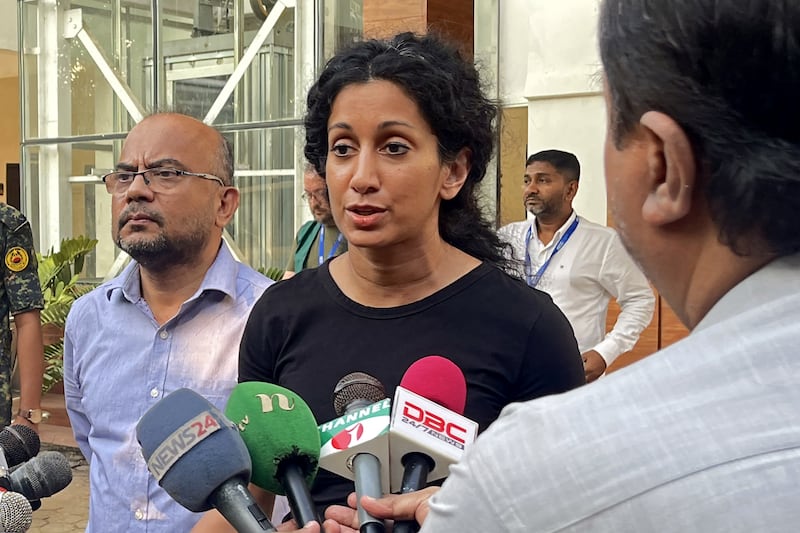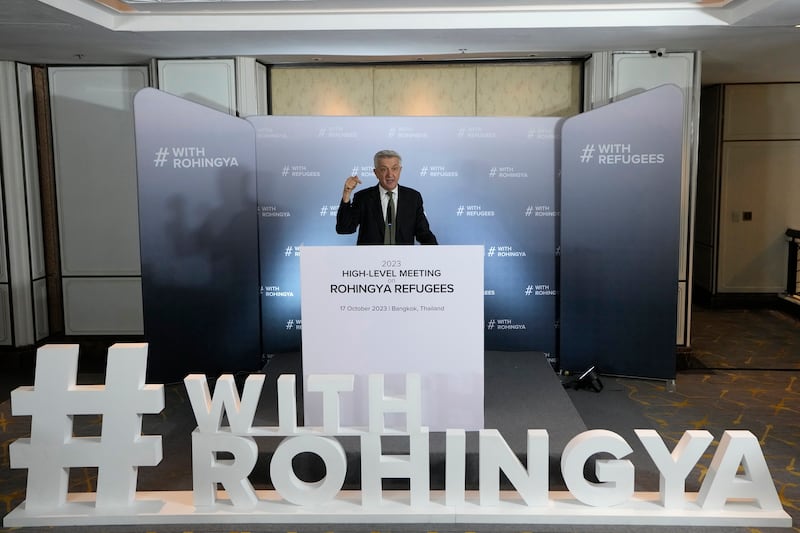Rohingya refugees in Bangladesh pleaded with a visiting U.S. State Department official Tuesday to help boost food aid to them, while the U.N. refugee agency’s chief urged donor countries to reverse dwindling humanitarian assistance to the stateless Rohingya.
The World Food Program (WFP) twice this year has reduced its food allocation for Rohingya refugees to U.S. $8 per person per month, as more than half of the yearly support requested by the United Nations remains unmet, U.N. officials said.
“I have a family of seven members, and due to the reduction in rations, we are starving,” said Nur Jahan, a refugee who met with Afreen Akhter, the U.S. assistant secretary of state for South and Central Asia, in Cox’s Bazar on Tuesday.
The southeastern district along the border with Myanmar is home to sprawling camps and settlements where about 1 million Rohingya are sheltering.
“Rohingya people are increasingly trying to go outside the camps in search of work, and many of them are being detained by police,” she said. “Others are getting involved in illicit activities because they don’t have enough food.”
Bangladesh’s government, which has hosted hundreds of thousands of Rohingya refugees for years, has steadfastly rejected requests to allow them to work outside their camps, making them almost completely reliant on foreign aid.
Jamila Akhter, a 25-year-old pregnant woman from the Ukhia refugee camp, told Akhter that she worried about her unborn child’s health.
“I am an expectant mother. I should be able to eat better now,” she told BenarNews. “But we are not getting any nutritious food.”

The U.S. official said she had witnessed the “dire conditions” in the camps, but she also emphasized the United States’ oversized role in helping the refugees.
“The United States is the single largest donor, by far, when it comes to supporting Rohingya refugees,” she told reporters after meeting with local officials in Cox’s Bazar. “We’ve far outpaced anyone else in our support for Bangladesh in their response to this crisis.”
The U.S. has contributed $2.2 billion in response to the humanitarian crisis since 2017 when at least 740,000 Rohingyas fled Myanmar during a military crackdown that a top U.N. official described as “a textbook example of ethnic cleansing.”
Meanwhile in Bangkok on Tuesday, Filippo Grandi, the United Nations high commissioner for refugees, urged donor nations during a high-level meeting on the regional Rohingya refugee crisis to make substantial pledges of support for the Rohingya.
“This is a crisis that should not be forgotten ... If contributions decline, we are in trouble,” Agence France-Presse quoted him as saying.

A humanitarian fund for the Rohingya managed by the U.N. has so far received only 42% of the $875.9 million required for the refugees this year, according to data from the United Nations.
At the gathering in Bangkok, the British government committed $5.5 million (£4.5 million) in fresh support, which appeared to be the only instance of a new pledge of substantial aid announced so far.
“This decline in humanitarian assistance makes it more difficult to continuously, for example, renew the shelters,” Grandi said, according to the Reuters news agency.
“You have to invest money all the time and that money is becoming short, so conditions are now beginning to regress.”
